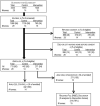BABEL (Better tArgeting, Better outcomes for frail ELderly patients) advance care planning: a comprehensive approach to advance care planning in nursing homes: a cluster randomised trial
- PMID: 35325020
- PMCID: PMC8946666
- DOI: 10.1093/ageing/afac049
BABEL (Better tArgeting, Better outcomes for frail ELderly patients) advance care planning: a comprehensive approach to advance care planning in nursing homes: a cluster randomised trial
Abstract
Background: Nursing home (NH) residents should have the opportunity to consider, discuss and document their healthcare wishes. However, such advance care planning (ACP) is frequently suboptimal.
Objective: Assess a comprehensive, person-centred ACP approach.
Design: Unblinded, cluster randomised trial.
Setting: Fourteen control and 15 intervention NHs in three Canadian provinces, 2018-2020.
Subjects: 713 residents (442 control, 271 intervention) aged ≥65 years, with elevated mortality risk.
Methods: The intervention was a structured, $\sim$60-min discussion between a resident, substitute decision-maker (SDM) and nursing home staff to: (i) confirm SDMs' identities and role; (ii) prepare SDMs for medical emergencies; (iii) explain residents' clinical condition and prognosis; (iv) ascertain residents' preferred philosophy to guide decision-making and (v) identify residents' preferred options for specific medical emergencies. Control NHs continued their usual ACP processes. Co-primary outcomes were: (a) comprehensiveness of advance care planning, assessed using the Audit of Advance Care Planning, and (b) Comfort Assessment in Dying. Ten secondary outcomes were assessed. P-values were adjusted for all 12 outcomes using the false discovery rate method.
Results: The intervention resulted in 5.21-fold higher odds of respondents rating ACP comprehensiveness as being better (95% confidence interval [CI] 3.53, 7.61). Comfort in dying did not differ (difference = -0.61; 95% CI -2.2, 1.0). Among the secondary outcomes, antimicrobial use was significantly lower in intervention homes (rate ratio = 0.79, 95% CI 0.66, 0.94).
Conclusions: Superior comprehensiveness of the BABEL approach to ACP underscores the importance of allowing adequate time to address all important aspects of ACP and may reduce unwanted interventions towards the end of life.
Keywords: Advance care planning; cluster randomised studies; nursing homes; older people.
© The Author(s) 2022. Published by Oxford University Press on behalf of the British Geriatrics Society. All rights reserved. For permissions, please email: journals.permissions@oup.com.
Figures
References
-
- Care of Older People UK Market Report. London: LaingBuisson; 2016; 27th.https://www.laingbuisson.com/wp-content/uploads/2016/06/Care_OlderPeople.... (cited 24 September 2021).
-
- Hirdes JP, Mitchell L, Maxwell CJ, White N. Beyond the `Iron Lungs of Gerontology': Using Evidence to Shape the Future of Nursing Homes in Canada. Can J Aging 2011; 30: 371–90. - PubMed
-
- Katz P. An international perspective on long term care: focus on nursing homes. J Am Med Dir Assoc 2011; 12: 487–492.e1. - PubMed
-
- Nursing Home Care . Centers for Disease Control; 2020. https://www.cdc.gov/nchs/fastats/nursing-home-care.htm. (cited 7 September 2020).
-
- Kojima G. Prevalence of frailty in nursing homes: a systematic review and meta-analysis. J Am Med Dir Assoc 2015; 16: 940–5. - PubMed



